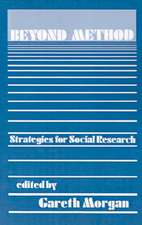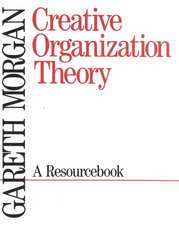Sociological Paradigms and Organisational Analysis: Elements of the Sociology of Corporate Life
Autor Gibson Burrell, Gareth Morganen Limba Engleză Paperback – 14 noi 1985
Preț: 424.91 lei
Nou
Puncte Express: 637
Preț estimativ în valută:
81.30€ • 85.12$ • 67.28£
81.30€ • 85.12$ • 67.28£
Carte tipărită la comandă
Livrare economică 05-19 aprilie
Preluare comenzi: 021 569.72.76
Specificații
ISBN-13: 9781857421149
ISBN-10: 1857421140
Pagini: 448
Ilustrații: black & white tables, figures
Dimensiuni: 138 x 216 x 32 mm
Greutate: 0.66 kg
Ediția:New ed
Editura: Taylor & Francis
Colecția Routledge
Locul publicării:Oxford, United Kingdom
ISBN-10: 1857421140
Pagini: 448
Ilustrații: black & white tables, figures
Dimensiuni: 138 x 216 x 32 mm
Greutate: 0.66 kg
Ediția:New ed
Editura: Taylor & Francis
Colecția Routledge
Locul publicării:Oxford, United Kingdom
Cuprins
Contents: Introduction. Part I In Search of a Framework: Assumptions about the nature of social science; Assumptions about the nature of society; Two dimensions: four paradigms. Part II The Paradigms Explored: Functionalist sociology; Functionalist organisation theory; Interpretive sociology; The interpretive paradigm and the study of organisations; Radical humanism; Anti-organisation theory; Radical structuralism; Radical organisation theory. Part III Conclusions: Future directions: theory and research. Bibliography; Index.
Notă biografică
Gibson Burrell is a lecturer in the Department of Behaviour in Organisations at the University of Lancaster, England. Gareth Morgan is Associate Professor of Organisational Behaviour and Industrial Relations, York University, Toronto.
Descriere
The authors argue in this book that social theory can usefully be conceived in terms of four broad paradigms, based upon different sets of meta-theoretical assumptions with regard to the nature of social science and the nature of society. The four paradigms - Functionalist, Interpretive, Radical Humanist and Radical Structuralist - derive from quite distinct intellectual traditions, and present four mutually exclusive views of the social work. Each stands in its own right, and generates its own distinctive approach to the analysis of social life.























